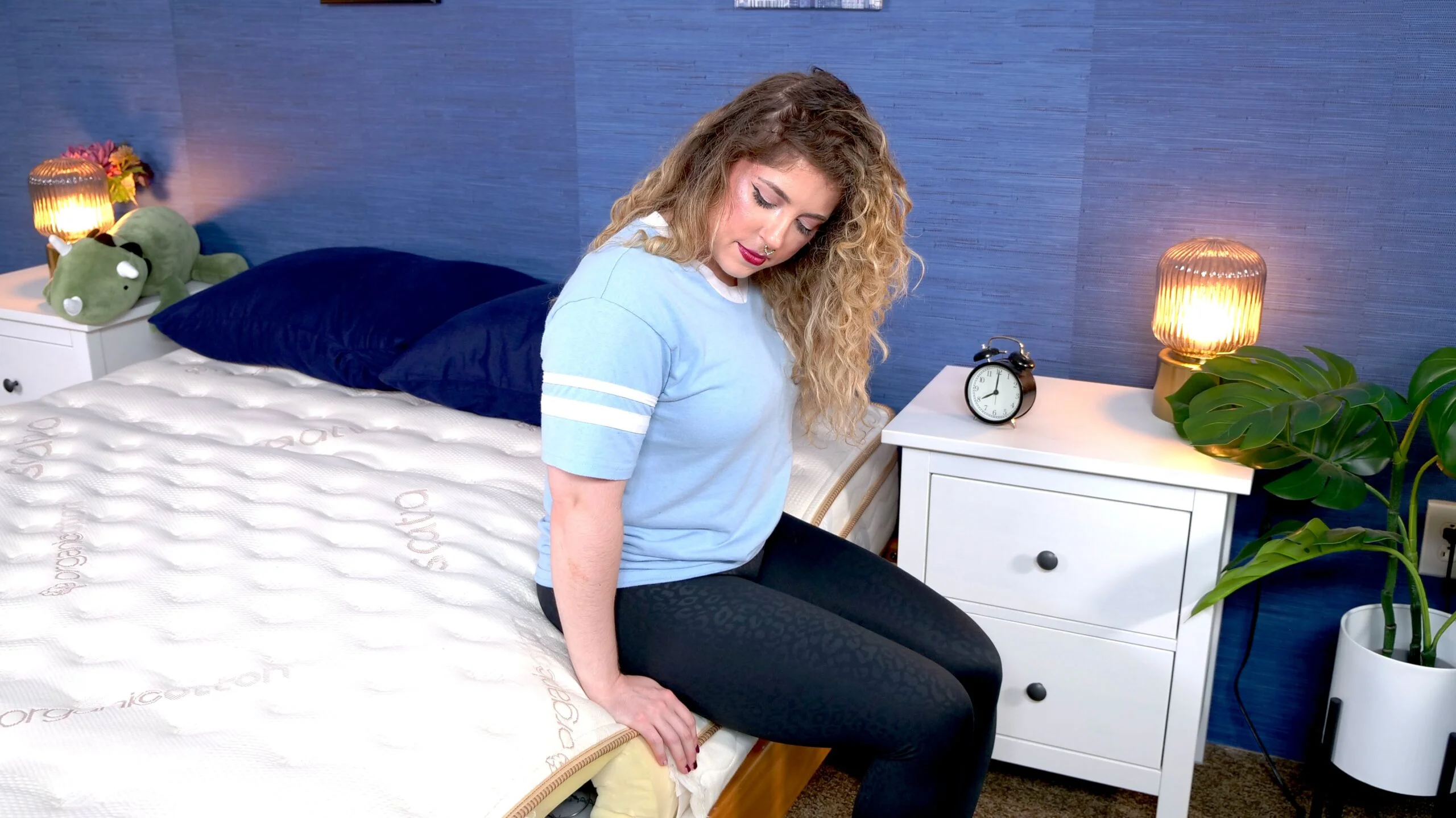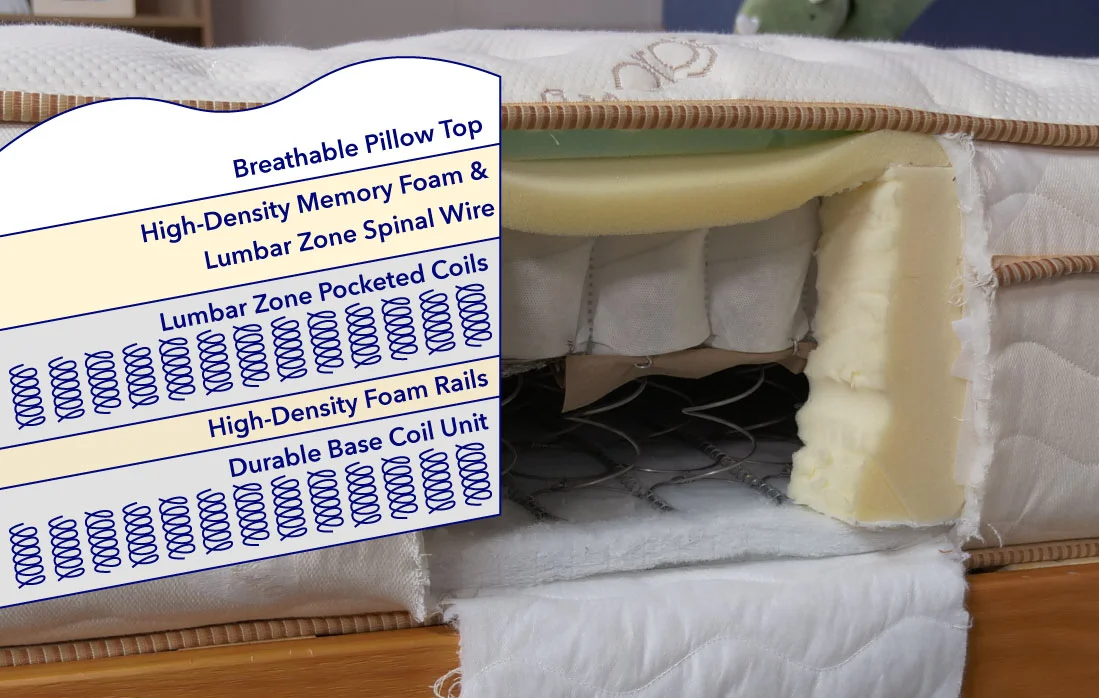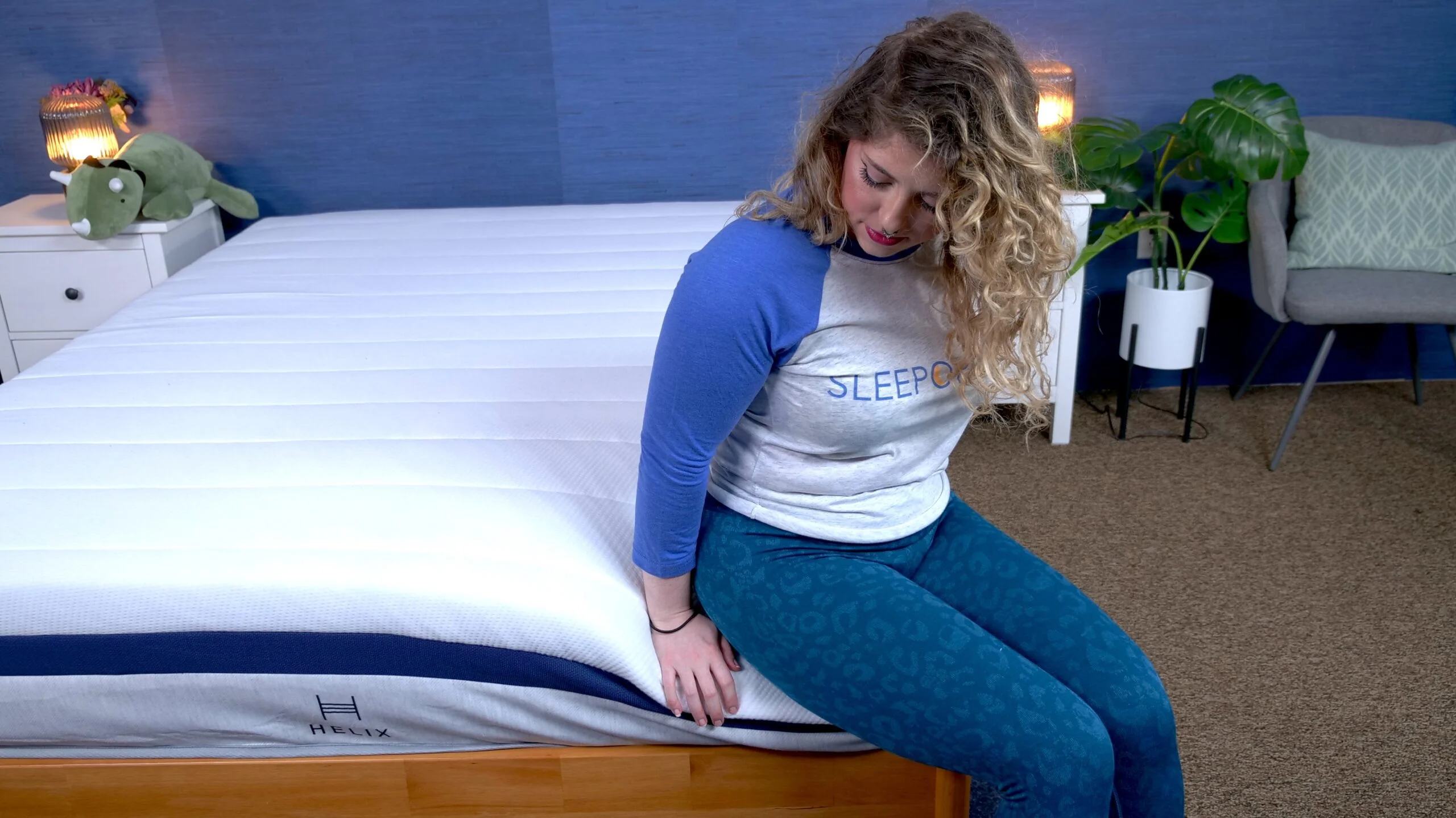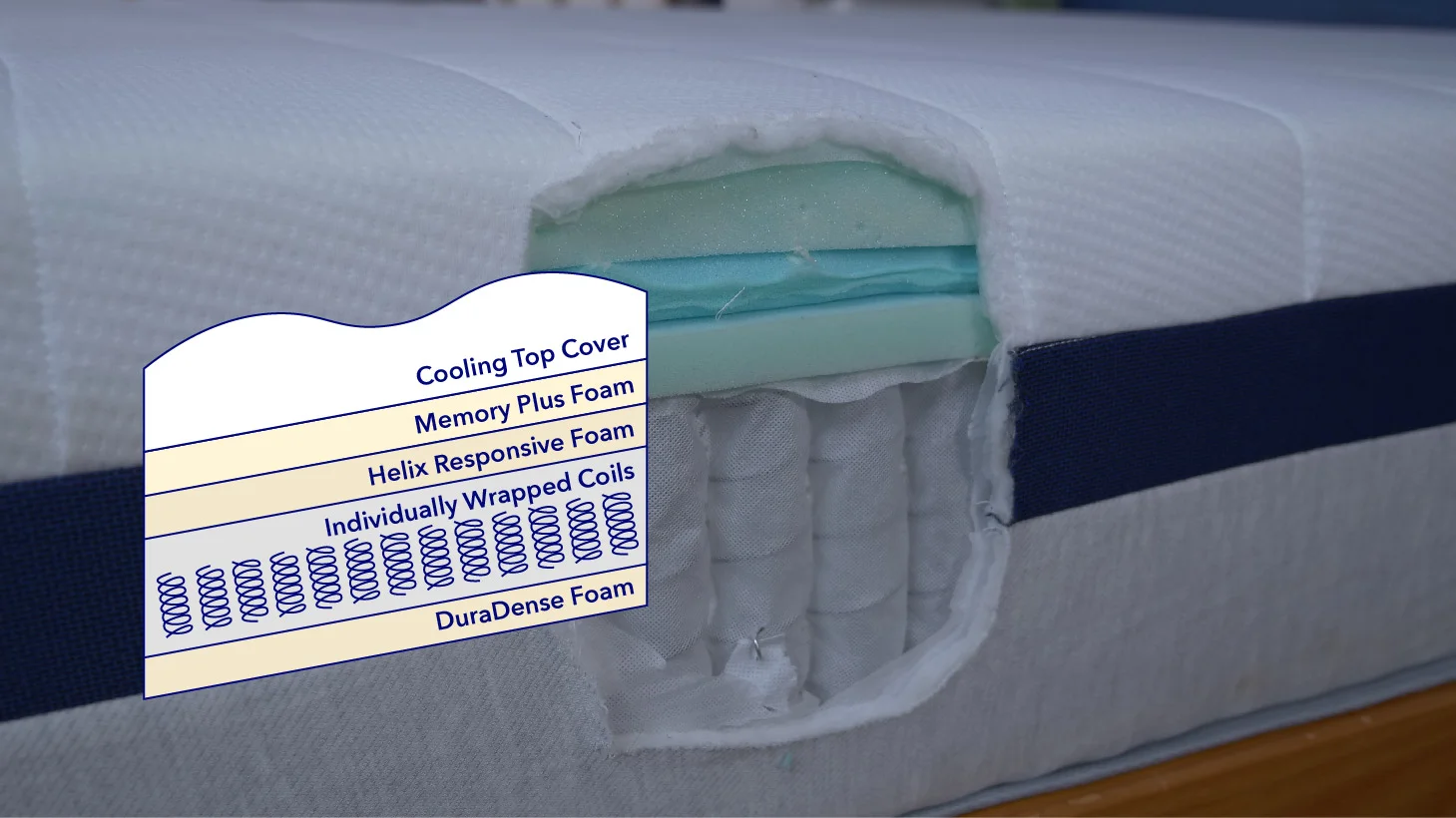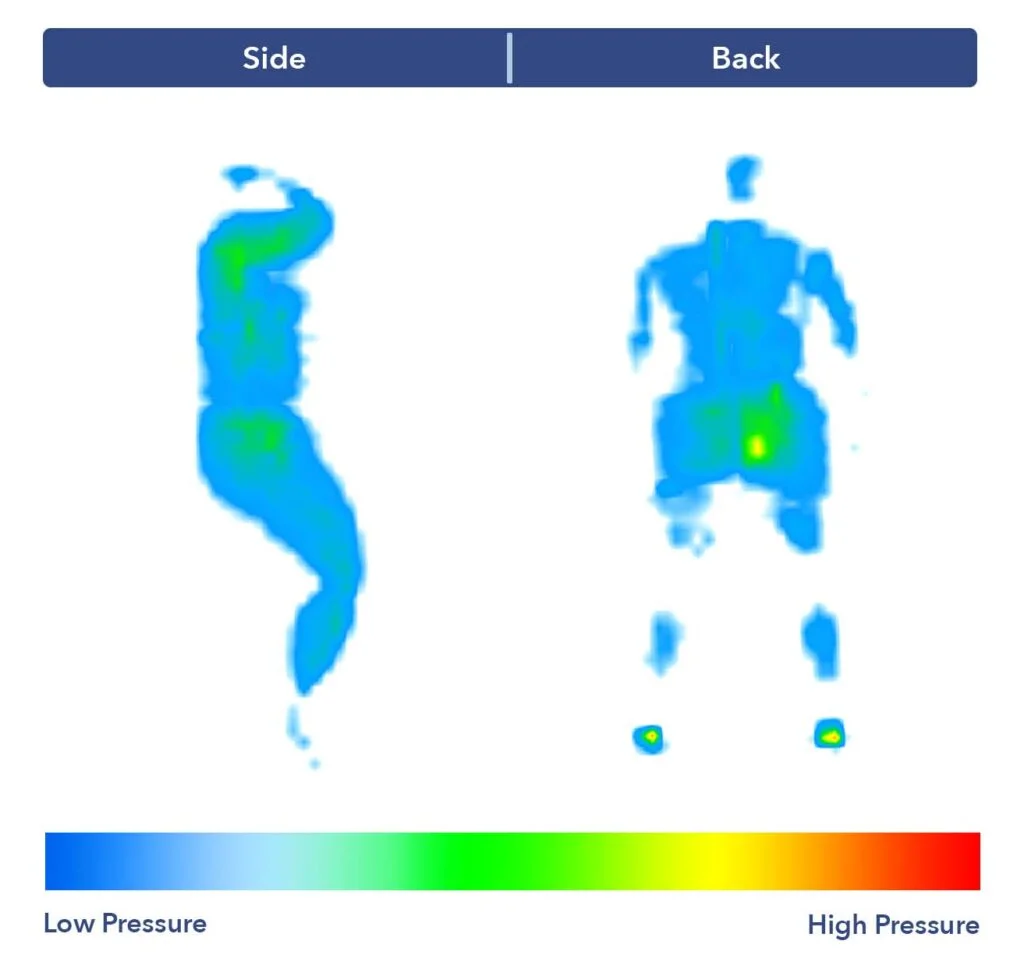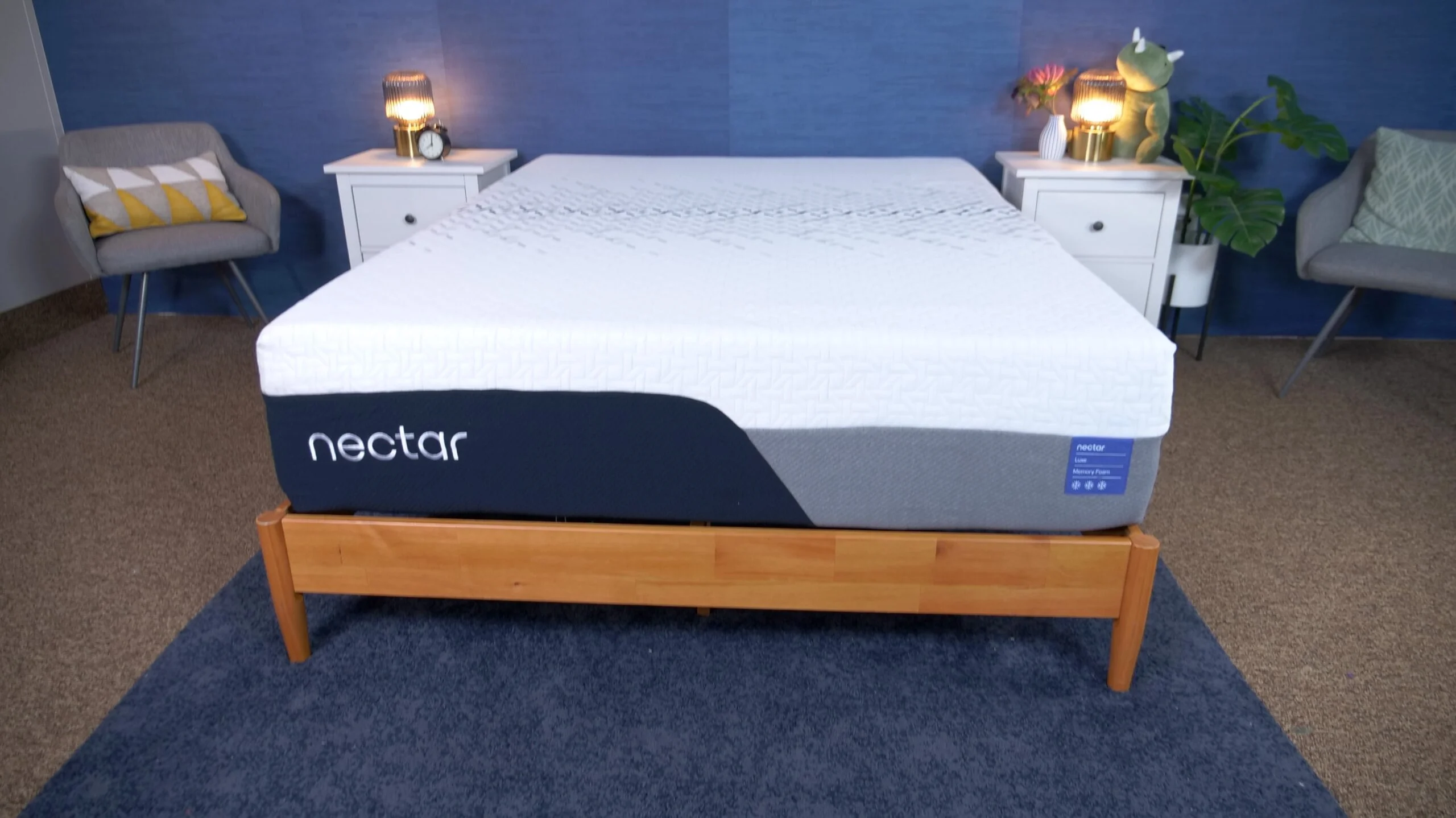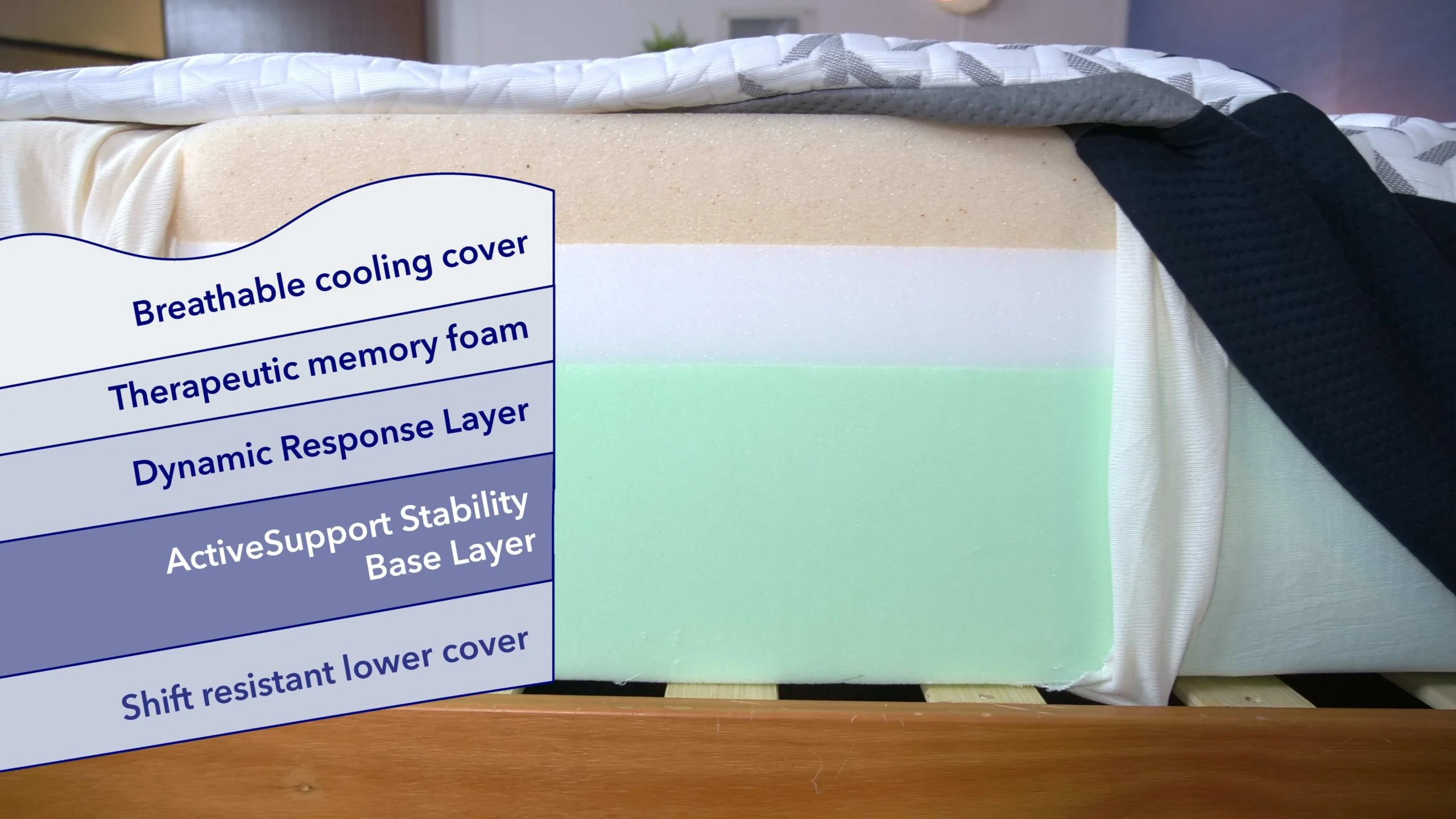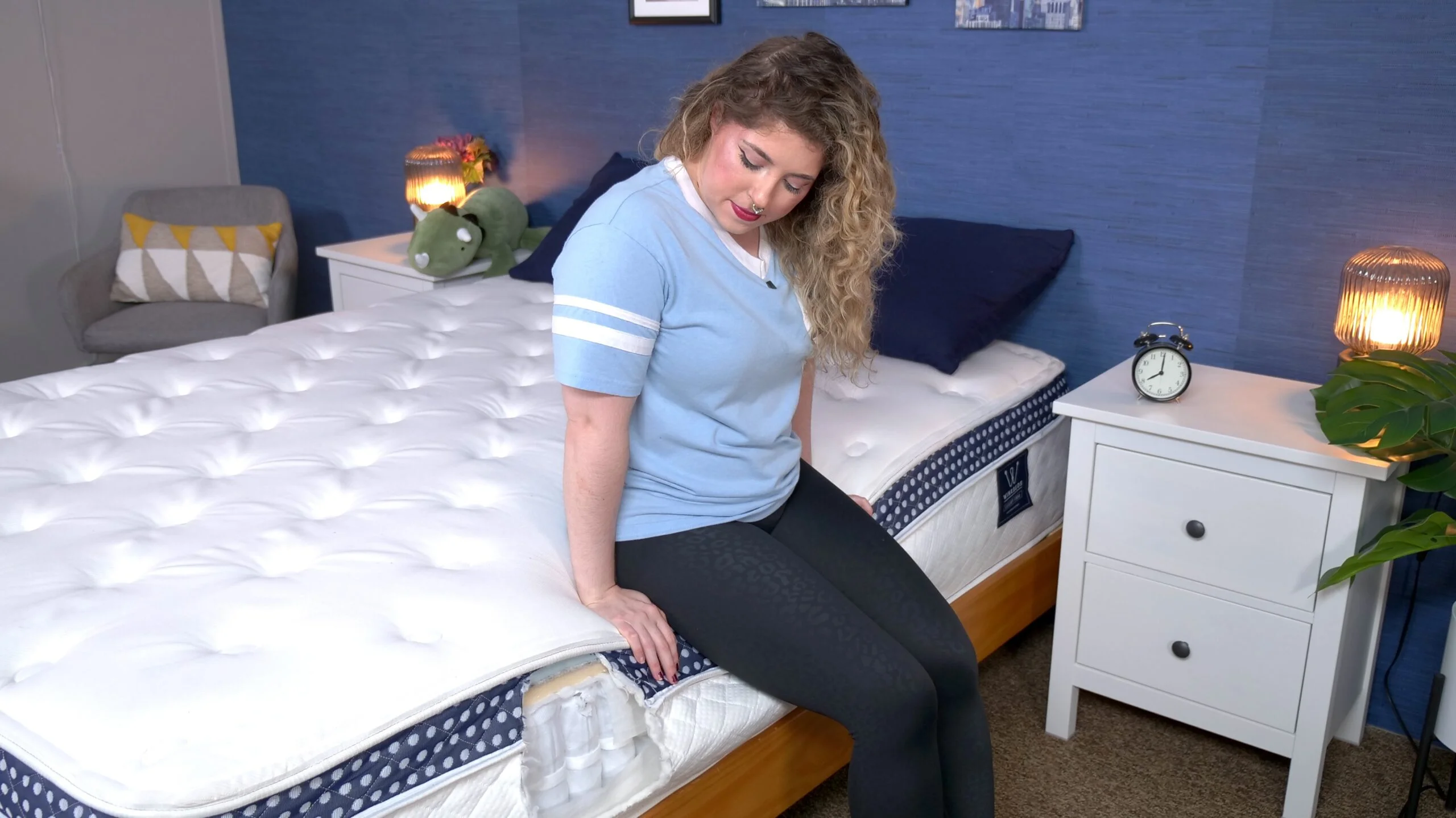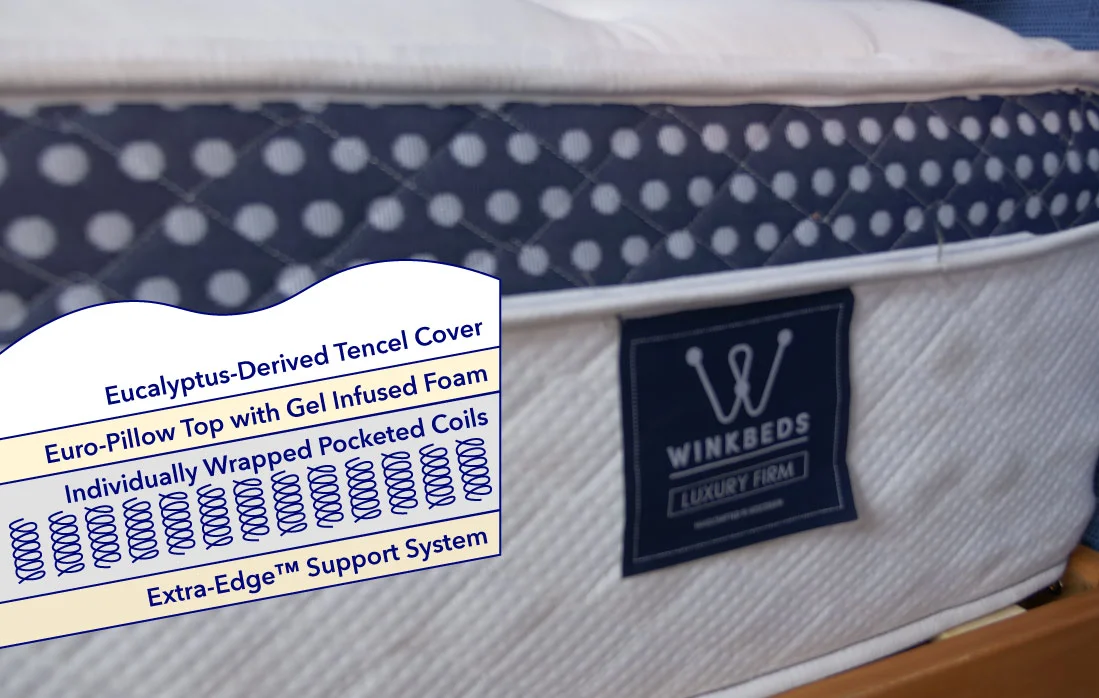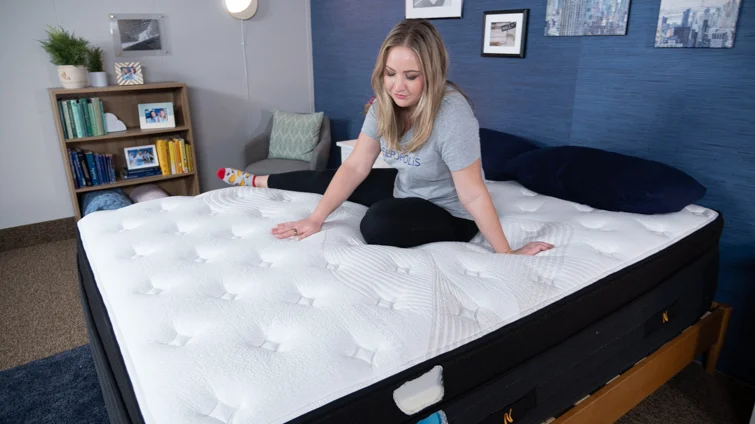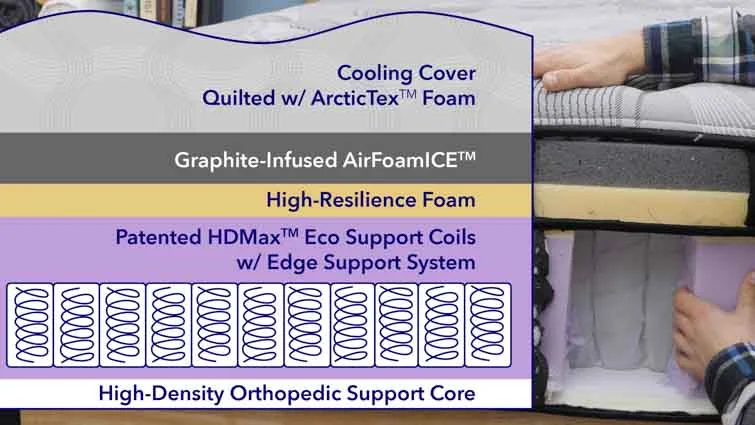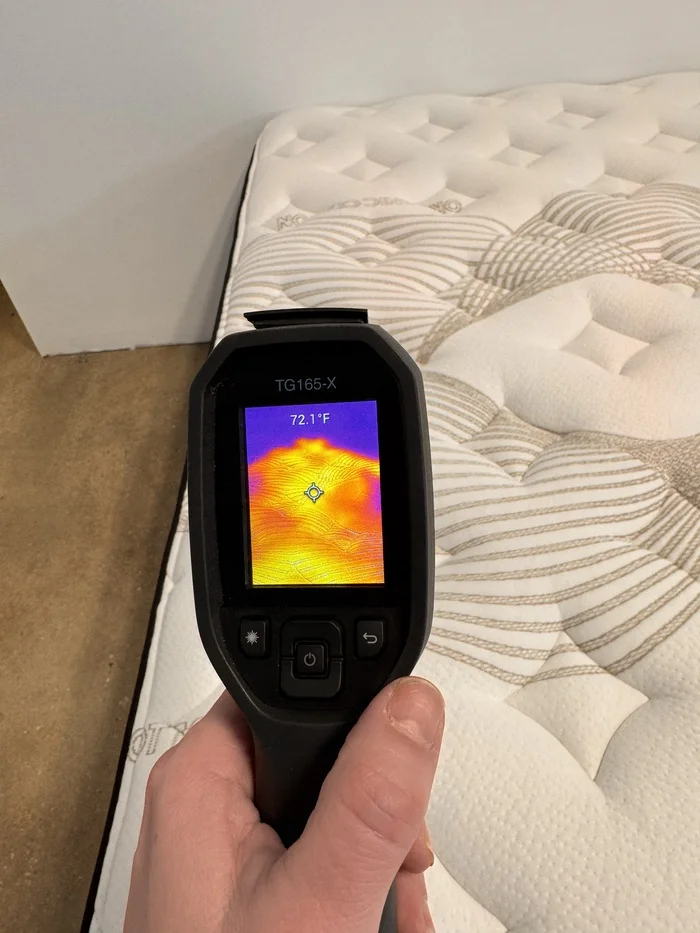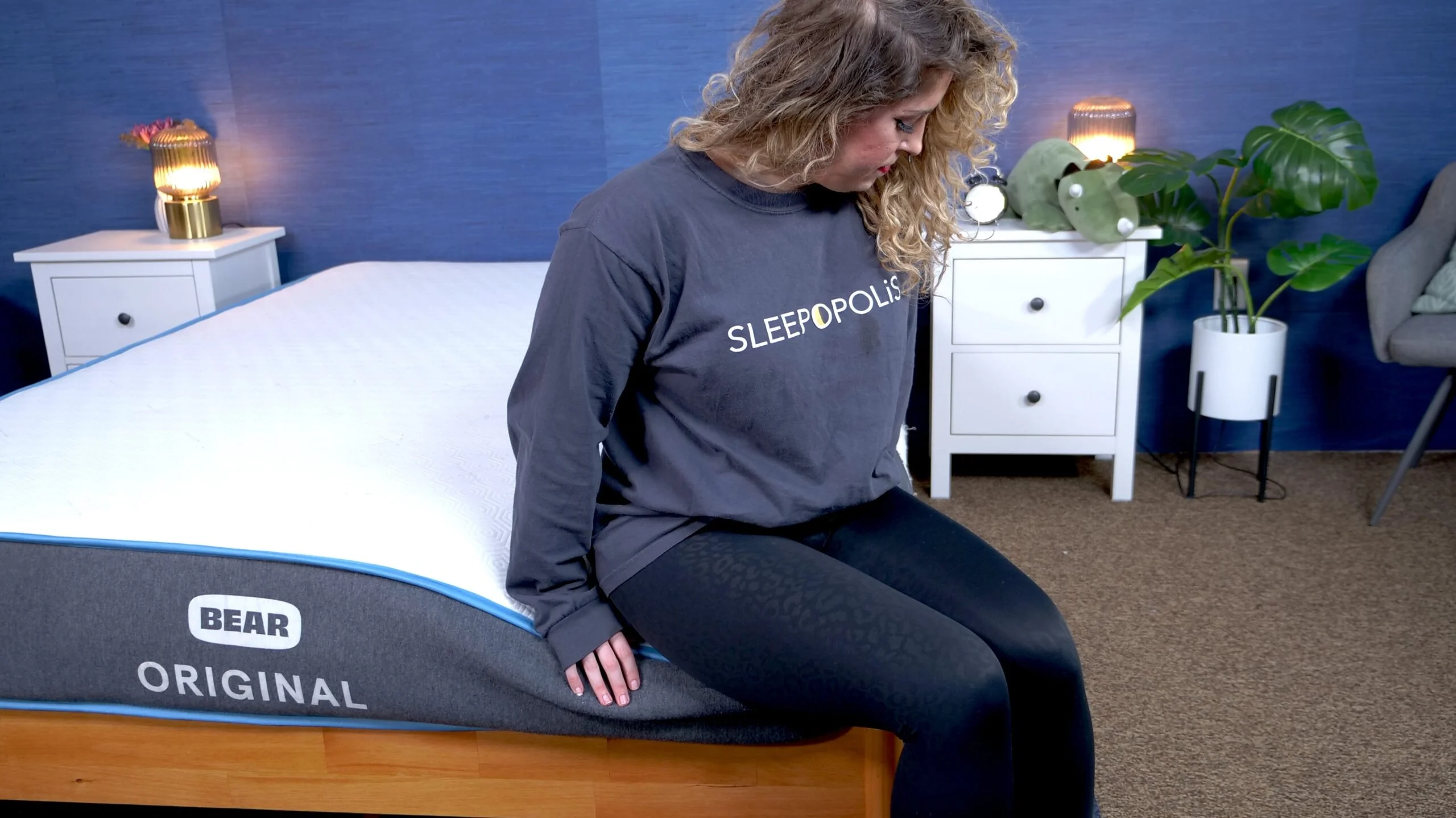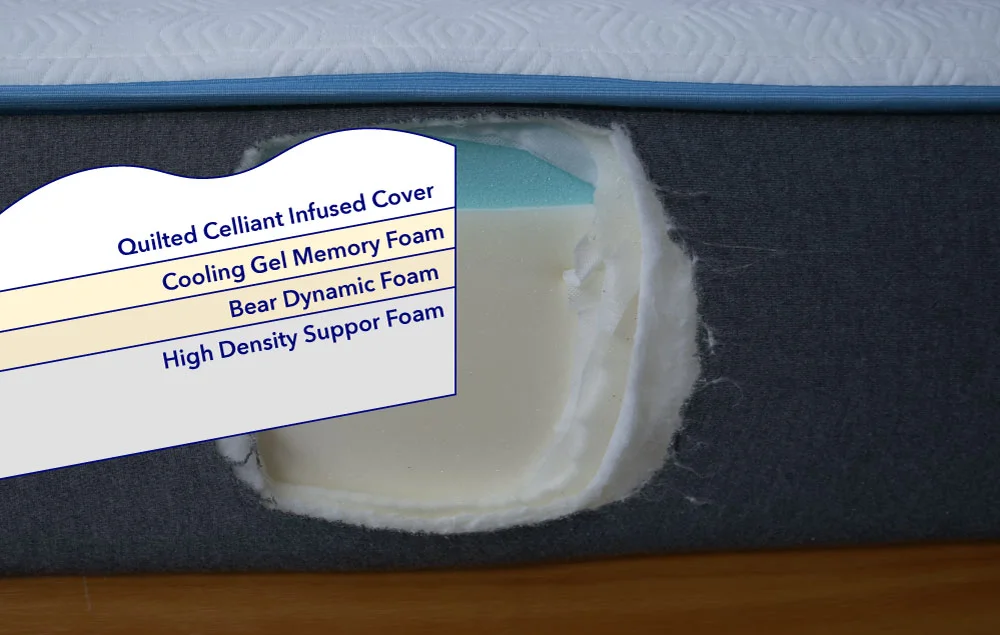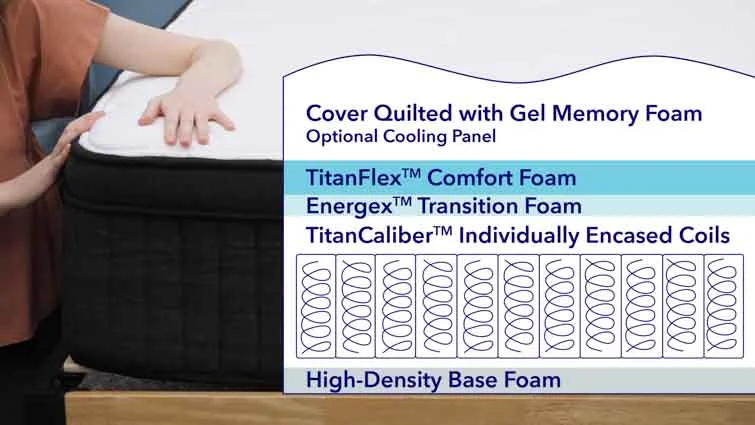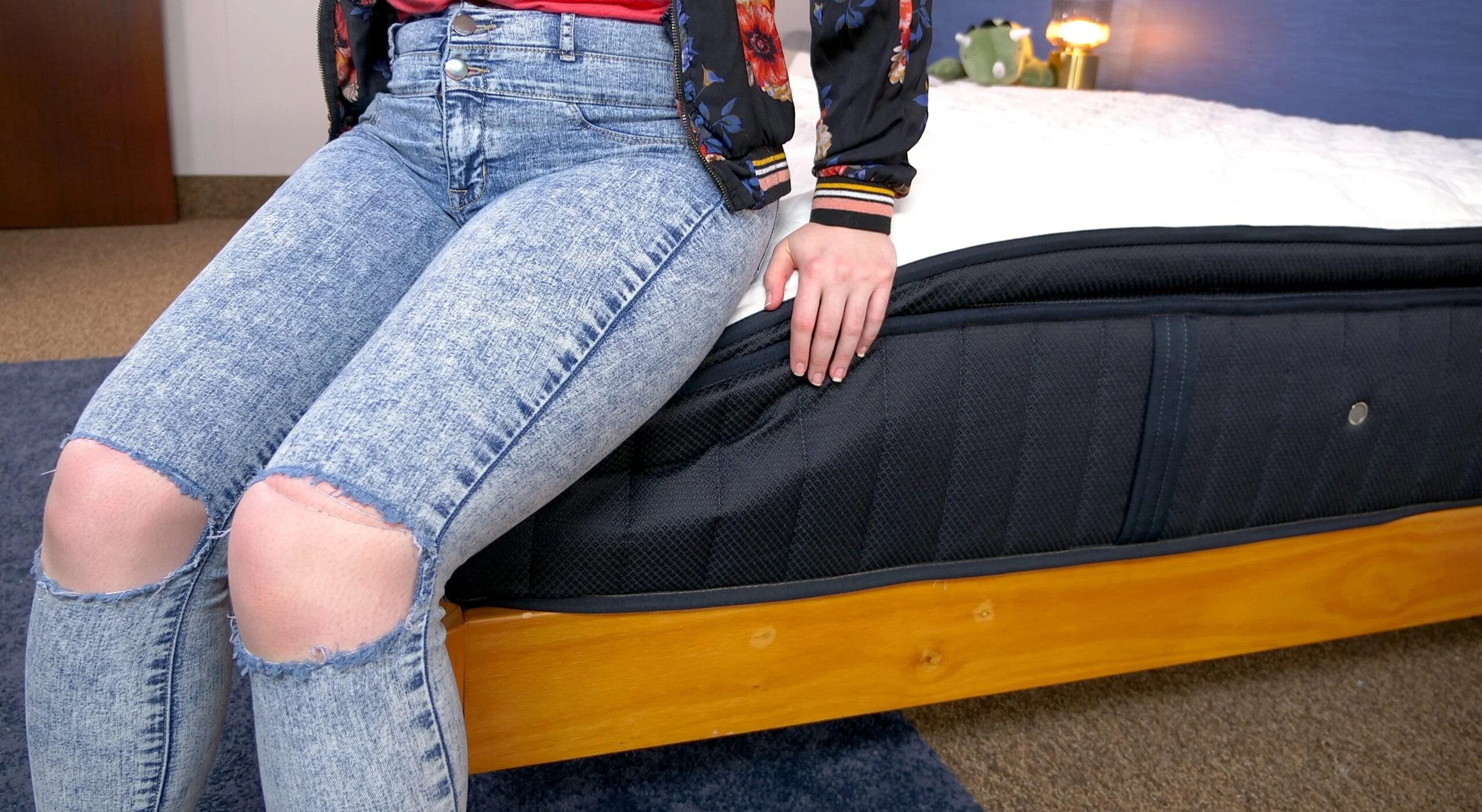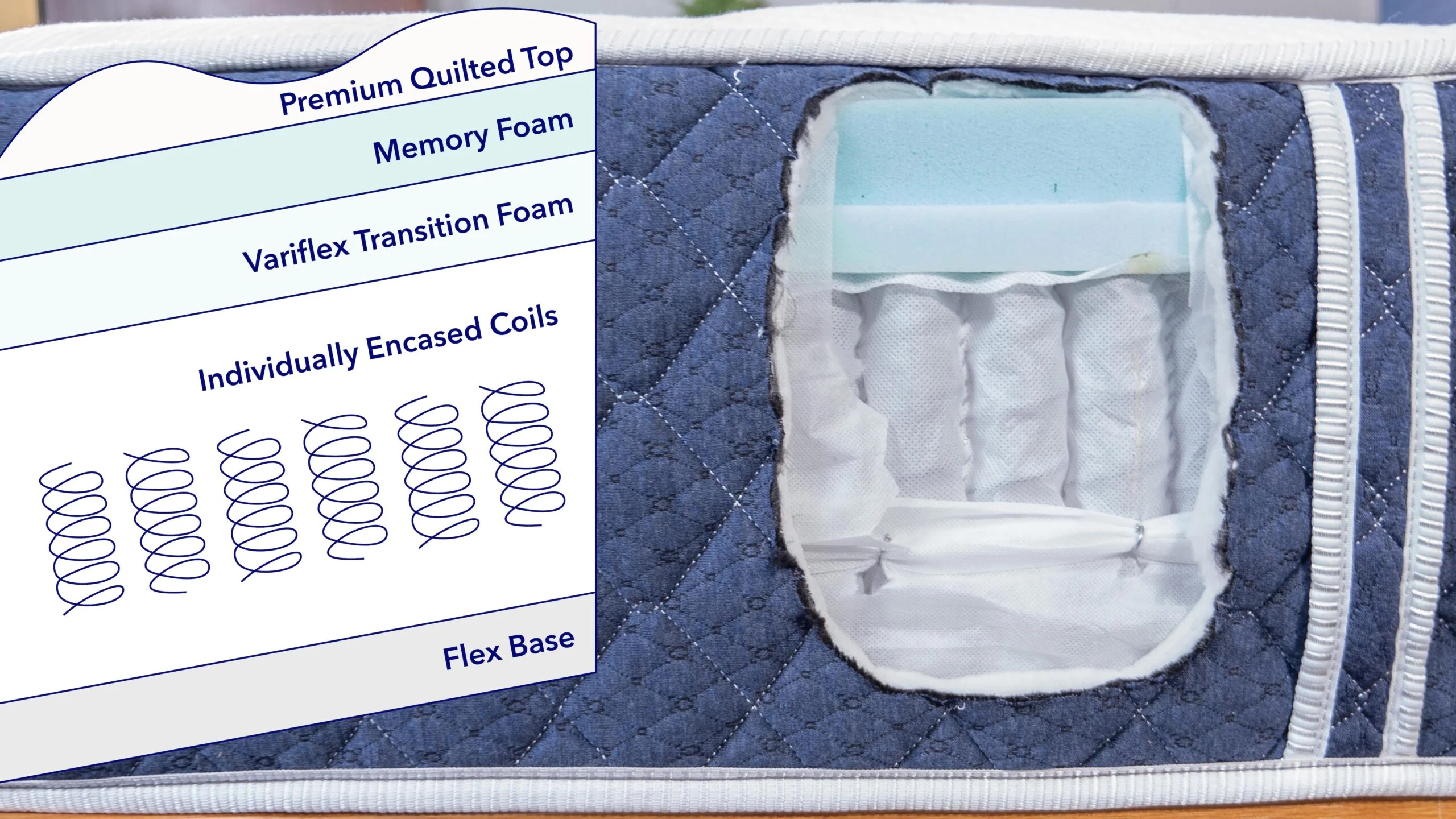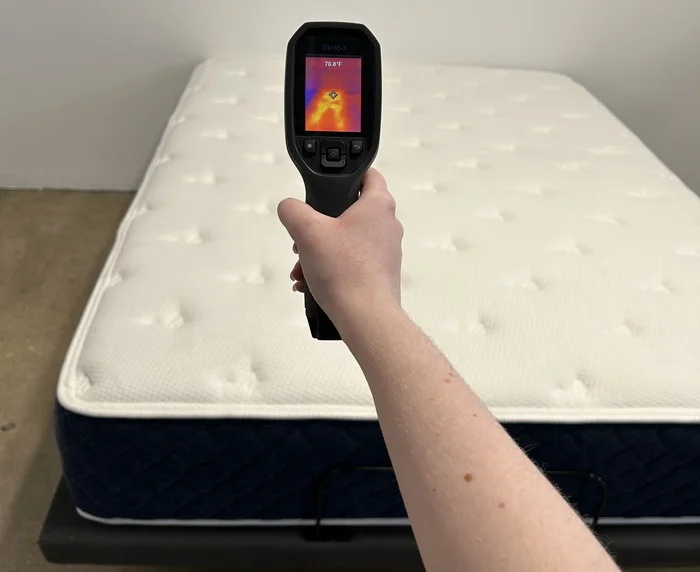If you are one of the 53 million adults in the United States who experience arthritis1, a disease characterized by swelling and tenderness of your joints2, you can help manage your chronic pain and symptoms by sleeping on the right mattress. The best mattresses for arthritis typically have exceptional pressure-relieving capabilities and a firmness that supports your preferred sleeping position and body type.
When selecting the best mattress for arthritis, we pulled from our sleep science coaches and mattress experts’ wealth of experience and expertise, and the results of their hands-on testing of more than 300 mattresses. Our Chief Medical Product Tester Dr. Joe Tedesco, DPT, OCS, ATC, CSCS, tested several of the mattresses on this list and gave his evaluation of how it would perform for those with arthritis.
My fellow testers and I also consulted Sleepopolis’ chief medical advisor, Dr. Raj Dasgupta, MD, FACP, FCCP, FAASM, and quadruple-board certified in pulmonary, sleep, internal, and critical care medicine, to guide us on the health-based aspects of the best mattresses for arthritis.
We rank firmness on a scale of 1 to 10, with 1 being as soft as a cotton ball and 10 akin to sleeping on the sidewalk. The best beds for arthritis typically fall between 5–8 on the firmness scale. To make our comprehensive testing methodology more digestible, we rate the mattresses we test on a scale of 1 to 5 in several performance categories, and for the best mattresses for arthritis, we pay special attention to the following:
- Pressure Relief: Mattresses that offer deep contouring and a gentle sink can relieve pressure and help alleviate arthritis pain.
- Support: I pay special attention to a bed’s support system, as this part of a mattress helps keep spines in a neutral position, an essential part of easing aches and pains from arthritis.
- Responsiveness: A responsive mattress allows sleepers to reposition easily. If you have arthritis, this will help you move around without pain.
Sleepopolis’ Best In Rest — Arthritis Pain
We chose the Saatva as the best mattress for arthritis because it comes in several different firmness models, allowing people who deal with arthritis to choose if they want to prioritize pressure relief or support. It also has a coil-on-construction that makes it easy to move around, which can help prevent further pain when switching sleeping positions.
Best Mattress for Arthritis
- Saatva Classic – Best Overall
- Helix Midnight – Best Mattress for Arthritis in the Hips
- Nectar Luxe – Best Mattress for Arthritis in the Shoulders
- WinkBed – Best Mattress for Seniors With Arthritis
- Nolah Evolution – Best Hybrid Mattress for Arthritis
- Bear Original – Best Memory Foam Mattress for Arthritis
- Titan Plus Luxe – Best Mattress for Heavy People With Arthritis
- Brooklyn Bedding Signature Hybrid – Best Value Mattress for Arthritis
Disclaimer: Please note that the content in this article is meant for informational purposes only and should not be construed as medical advice or serve as a substitute for seeing a medical professional regarding any sleep problems you may have. Please see your doctor regarding any urgent medical issues.
What I Looked For in the Best Mattresses for Arthritis
As a certified sleep science coach who spends a lot of time with mattresses, I’ve learned that mattresses and the individual needs they serve are unique. For a mattress to be selected as one of the best for arthritis from the hundreds we tested, Sleepopolis’ team of sleep experts and certified sleep coaches examined how well a bed relieved pressure. Beds that are too firm or overly soft may cause pressure to build up, increasing arthritis pain. Once it was established that a bed had superior pressure relief, we also paid special attention to its performance in the following categories:
- Support: For a mattress to receive a 4 or higher in support, it must keep hips elevated and spines in a neutral position. Supportive beds prevent us from sinking too far into the layers, which can cause awkward spinal angles or pressure.
- Pressure relief: Those with arthritis need a mattress that prevents pressure from building up while sleeping. We use a two-tier approach to test pressure relief. First, we spend time on the mattress to see how it feels in different sleeping positions, and then we take thermal images called pressure maps to evaluate any areas where pressure may be present.
- Responsiveness: A bed’s responsiveness measures how quickly a mattress returns to its original shape after applying weight. Those that perform well in this category allow sleepers with arthritis to reposition easily.
- Motion isolation: If a partner’s tossing and turning keeps you up at night, your bed is likely lacking sound motion isolation. We test how well the materials and construction isolate movement, which may help those with arthritis experience less pain from being jostled about.
- Edge support: Beds with good edge support keep you secure along their perimeter and help you get in and out of bed more efficiently, which could benefit those experiencing the aches and pains of arthritis.
- Price: A new bed can be a convenient way to treat arthritis symptoms, and I wanted to include mattresses that would fit nearly every budget. With a competitive mattress market, price shouldn’t be a deterrent in getting a bed to ease arthritis pain.
Compare the Best Mattresses for Arthritis
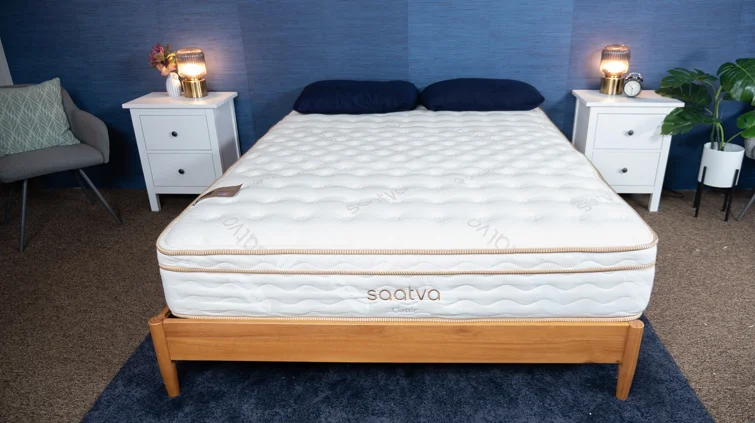 |  | 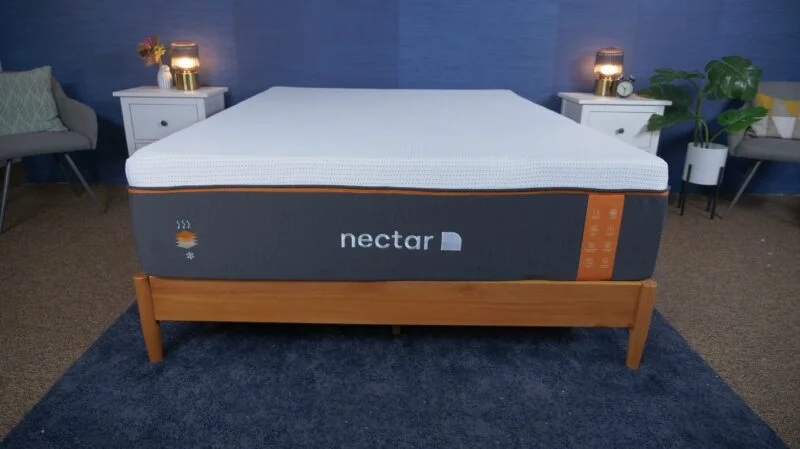 | 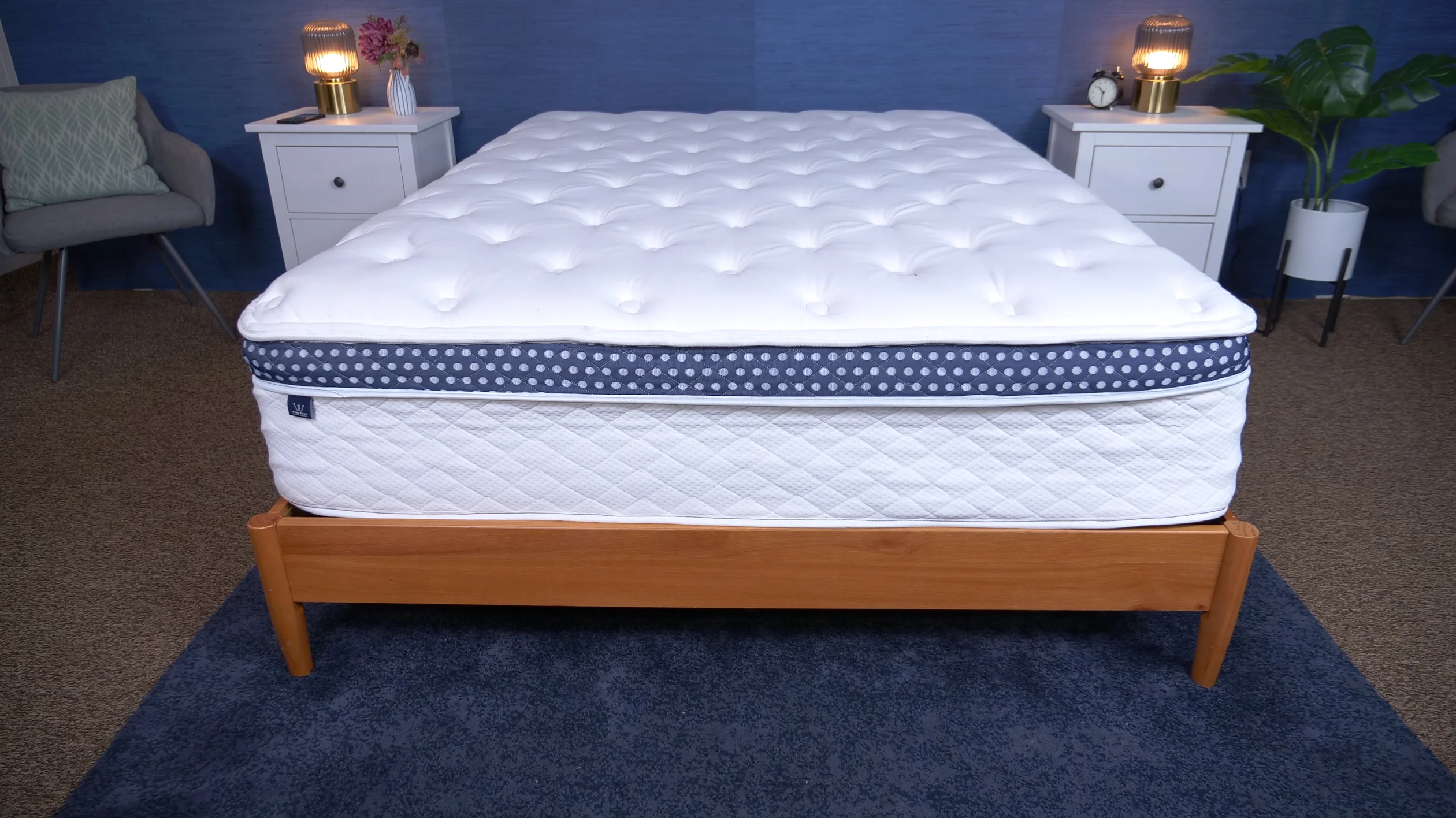 | 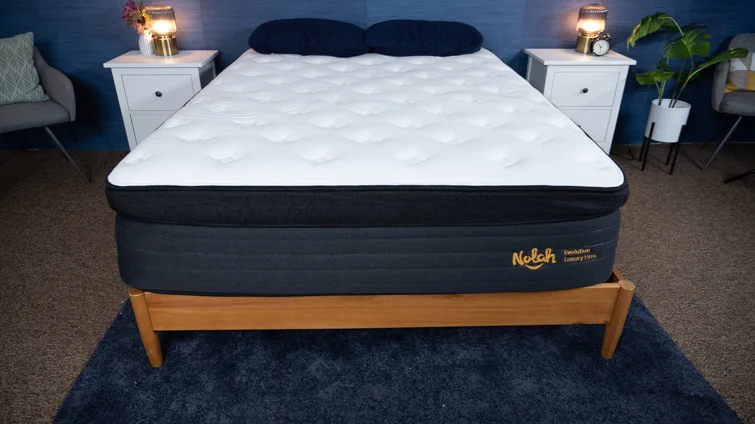 | 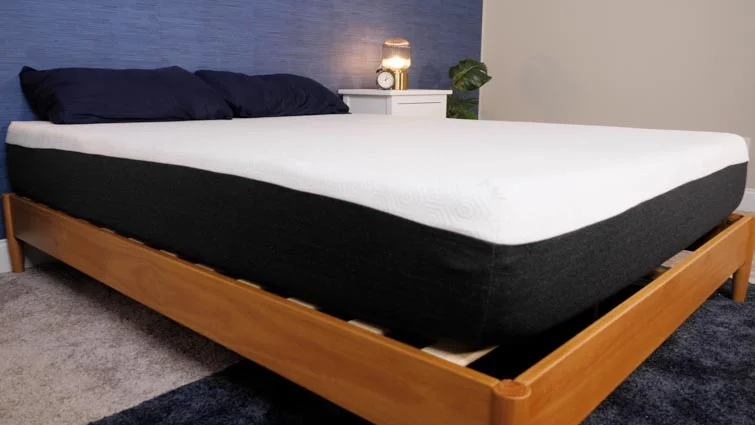 | 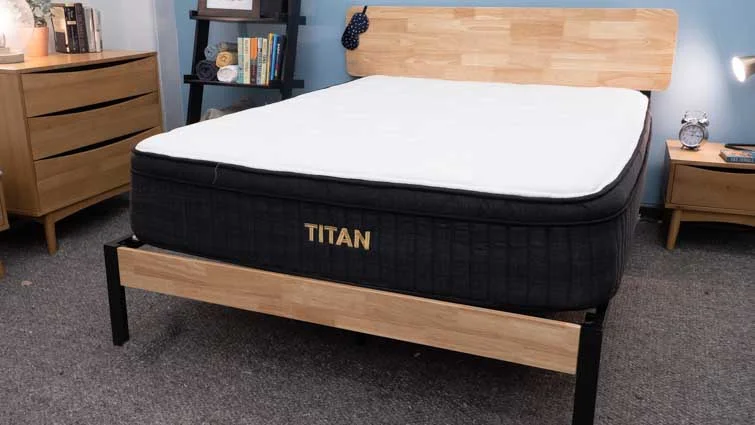 | 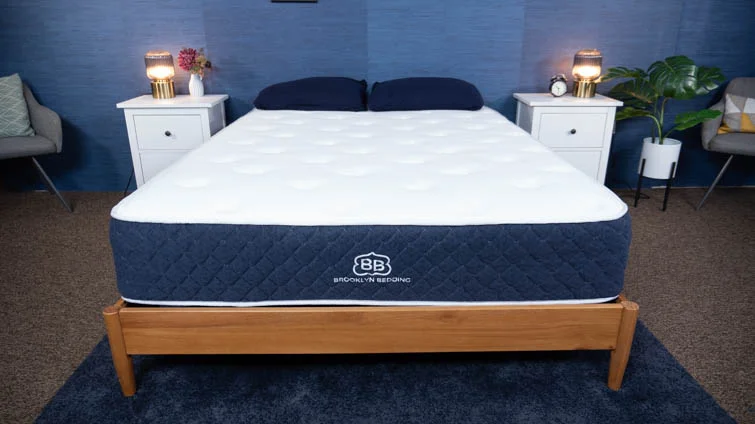 | |
| Saatva Classic | Helix Midnight Mattress | Nectar Premier Copper Mattress | WinkBed Mattress | Nolah Evolution Hybrid Mattress | Bear Original Mattress | Brooklyn Bedding Titan Plus Luxe | Brooklyn Bedding Signature Hybrid | |
| Rating | ||||||||
| Firmness | Multiple firmness options | Medium-firm: 6.5/10 | Firm: 7/10 | Firm: 7/10 | Multiple firmness options | Firm: 7/10 | Firm: 7.5/10 | Medium-firm: 6.5/10 |
| Material | Innerspring | Hybrid | Foam | Hybrid | Hybrid | Foam | Hybrid | Hybrid |
| Cooling | — | — | — | — | ||||
| Best For | Back Sleepers, Stomach Sleepers, Hot Sleepers, Back Pain, Seniors | Side Sleepers, Back Sleepers, Couples | Side Sleepers, Back Sleepers, Hot Sleepers, Hip Pain | Side Sleepers, Back Sleepers, Stomach Sleepers, Hot Sleepers, Back Pain | Side Sleepers, Back Sleepers, Hip Pain, Seniors | Back Sleepers, Stomach Sleepers, Hot Sleepers, Hip Pain | Side Sleepers, Back Sleepers | Side Sleepers, Back Sleepers, Hip Pain, Couples |
Best Mattresses for Arthritis Video Review
Saatva Classic – Best Overall
The Saatva’s coil-on-coil construction provides a classic innerspring feel. It’s a good option for combo sleepers, who will want to feel free to switch positions and avoid feeling “stuck” in the mattress. It comes in three firmness levels, so you should be able to find one that suits your needs. The white glove delivery Saatva provides is an added perk and will save you the headache of getting rid of your old mattress (they take it away for free!). For more information, watch our video review.
What our tester says:
“I think the Saatva is a great option for back sleepers, as the Luxury Firm model provides enough cushioning for their lumbar region, but also lots of support to keep their spine in a neutral alignment.” – Nichole Mondshein, lead reviewer and staff writer
Helix Midnight – Best Mattress for Arthritis in the Hips
The Helix Midnight is amongst Helix’s line of six standard mattresses. It’s known for its more balanced feel, allowing it to accommodate a wide range of sleepers. We also recommend it for couples, as it scored well on our motion isolation, responsiveness, edge support, and cooling tests. For a plusher and more cooling version of this mattress, see the Helix Midnight Luxe. Learn more in our video review.
What our tester says:
“I would recommend this mattress for side or back sleepers because it’s supportive, without putting pressure on your joints.” – Nichole Mondshein, lead reviewer and staff writer
Nectar Luxe – Best Mattress for Arthritis in the Shoulders
The Nectar Luxe is an ultra-plush yet supportive bed with a soft feel. It also provides a cool sleep experience, thanks to its cooling cover. We think it’s an especially good fit for back sleepers and side sleepers. Learn more in our video review.
What our tester says:
“I think side sleepers could really like the slow-moving, body-contouring feel of the Nectar Luxe. It should offer them plenty of pressure relief around the shoulders and hips. Back sleepers who prefer a softer mattress might also like this bed’s plush feel. It should offer these sleepers a nice balance of pressure relief and support.” – Nichole Mondshein, lead reviewer and staff writer
WinkBed – Best Mattress for Seniors With Arthritis
The WinkBed is a luxury hybrid mattress. It has a similarly supportive and sturdy feel to a traditional innerspring mattress, but upgrades like a Euro top and cooling Tencel cover give it a touch of modern luxury. Available in three firmness levels, there is a WinkBed for just about every sleeper. And a responsive and bouncy feel makes it a great pick for combination sleepers. Learn more in our video review.
What our tester says:
“If you like the feel of a traditional innerspring mattress, the WinkBed could work for you. Since this bed offered great pressure relief around my lumbar region, I’d also recommend it to folks who suffer from lower back pain.” – Nichole Mondshein, lead reviewer and staff writer
Nolah Evolution – Best Hybrid Mattress for Arthritis
The Nolah Evolution’s hybrid construction offers the cushioning of memory foam with the responsiveness of coils. The Luxury Firm model is a good option for side and back sleepers due to its medium-firm feel, though there are Plush and Firm versions as well. Those who share a bed may also appreciate its low motion transfer, so you won’t be disturbed by a partner’s movements and its solid edge support to allow you to maximize surface area. For more information, check out our video review.
What our tester says:
“I laid down to rest on this mattress on my back — my primary sleep position. I felt comfortable, but also appreciated the cozy, plush top of the bed. After some time lying on my back, I switched over to my side. I didn’t find this position quite as comfortable, as I did feel some slight pressure buildup in my shoulder.” – Amelia Jerden, senior staff writer
Bear Original – Best Memory Foam Mattress for Arthritis
Even though it’s made entirely of foam, the Bear has a firm, supportive feel that should be sturdy enough for back sleepers and stomach sleepers alike. Additionally, combination sleepers should be able to easily move around on its surface. You can also pay extra for a Celliant cover that may help with cooling and muscle recovery. Learn more in our video review.
What our tester says:
“I found the double poly foam construction produced a firm, supportive feel. Though you’re likely to sink into its top layer of memory foam, this sinkage is somewhat curbed by the taut poly foam transition layer. This means most folks are going to be positioned more “on top” of the structure than “in” it.” – Nichole Mondshein, lead reviewer and mattress tester
Titan Plus Luxe – Best Mattress for Heavy People With Arthritis
The Titan Plus Luxe provides a sturdy and supportive, but still comfortable and luxurious sleep experience for heavy sleepers. The medium-firm feel can work for heavy back and side sleepers, but can also work for some light and average weight folks too. This means mixed-weight couples particularly might enjoy this mattress, especially since it has excellent motion isolation and strong edge support. Learn more in our video review.
What our tester says:
“If you’re a heavy sleeper looking for a bed made of high-quality materials, the Titan Plus Luxe is a great option for you. It’s built to last and should do a great job supporting heavier sleepers, especially back, side, and combination sleepers.” – Madison Schaper, former Sleepopolis staff writer and mattress tester
Brooklyn Bedding Signature Hybrid – Best Value Mattress for Arthritis
The Brooklyn Bedding Signature Hybrid mattress combines a foam comfort layer and sturdy coils. This combination of materials makes it bouncy and easy to move around on. It comes in three firmness levels, and we recommend the Medium model for most back sleepers. It’s a great choice for shoppers who are looking for a new mattress on a budget. For more information, check out our video review.
What our tester says:
“Given that the Signature Hybrid has some excellent bounce, I’d highly recommend this mattress for combination sleepers who often change positions multiple times throughout the night. I also think the Signature Hybrid could be a great fit for couples. You shouldn’t be overly disturbed by a restless partner on this bed, and it has nice, firm edge support.” – Nichole Mondshein, lead reviewer and staff writer
Other Mattresses for Arthritis I Considered
After much deliberation, consideration, and consultation, I decided on the best eight mattresses for arthritis. Given the number of quality beds available, this was no easy task. Check out three other superior mattresses that just missed the cut.
Nolah Signature
This all-foam bed is less expensive than the Nolah Evolution that made our list. Although this bed offers excellent pressure relief, a feature that those with arthritis often need, I left it off because it is too soft for stomach sleepers and those who weigh over 230 pounds. It also doesn’t provide the traditional memory foam “sink” that fans of these beds typically enjoy.
DreamCloud
With a 4.4 overall score and high scores in support, durability, and pressure relief, the DreamCloud was a top contender for a slot on the best mattress for arthritis. However, there were already a few higher-end mattresses on the list, and I like to provide a range of pricing options.
Birch Natural
Eco-conscious folks with arthritis will want to look at the Birch Natural mattress from Helix Sleep. While I am a big fan of organic materials, especially the cooling latex, the firmness, short sleep trial, and price caused me to cross this one off.
How We Picked and Tested the Best Mattresses for Arthritis
Every mattress, over 330 to date, that comes through our sleep lap undergoes a thorough hands-on testing process conducted by our team of certified sleep coaches and product experts. In addition to the in-person testing, we researched the types of beds that would benefit those with arthritis and consulted extensively with healthcare professionals such as Dr. Raj Dasgupta, a quadruple board-certified physician in sleep medicine.
In his video “What Mattress Firmness is Best for People with Arthritis,” Dr. Raj says “When we talk about what is going to be the best mattress, the best position for arthritis, I always think about, it’s individualized because it’s what joint: Is it the lower back? Is it going to be the hip? Whatever is going to be soft to that joint is what we want.”
In the sleep lab, conducting tests can be like having a slumber party at work. We lie around and even jump on beds and then discuss our findings with each other so that we can finalize scores and evaluations in categories such as pressure relief, firmness, support, cooling, motion transfer, and more on a testing sheet that we rely on to write articles at a later date.
Although our evaluations are based on our experience and expertise, we understand that they are still somewhat subjective. We use tests and equipment such as pressure maps and thermal temperature guns to bring more quantitative data. Pressure maps are color-coded thermal images to see how much pressure is building up around our body and temperature guns allow us to know the surface temperature of a mattress before and after someone has been on it.
We also use a seismograph app to record how much motion is felt from one side of the bed to the other. To conduct this test, we set our phones with the app running on one side of the bed and then mimic the movements a partner would make getting in and out of bed and repositioning through the night. For responsiveness, we drop a 10-pound ball from different heights to see if it bounces quickly or sinks into the mattress layers. We then repeat this process with a lacrosse ball to see if there is a difference because of the weight.
After consulting with medical professionals, running the testing, and writing down our evaluations, we assign individual scores for each category and then tally an overall score. Mattresses with a high overall score and a 4 or above in pressure relief, support, and edge support are nominated for best mattresses for arthritis.
What to Look for When Buying a Mattress for Arthritis
If you experience arthritis, the right mattress can help ease your pain and increase your sleep quality. To accomplish this, Dr. Raj Gasgupta, our chief medical advisor, says “Choose a medium soft to medium firm mattress made of high-quality materials like memory foam or latex to give you the best pressure point relief. Features like zoned support, motion isolation, and temperature regulation are all also great things to look for.”
If these terms sound like a foreign language, don’t worry; we will break them down so you can find the best choice that fits your personal preferences and needs. By the end of this buyer’s guide, you’ll be talking like a mattress guru.
Pressure Relief
Pressure relief refers to the amount of pressure alleviated on a specific part of the body when lying on a mattress. Good pressure relief can be significant for sleepers with arthritis because they may experience pain and discomfort at night, and pressure alleviation around aching joints can help lessen pain, allowing for better sleep. If you have arthritis, we recommend looking for a mattress that offers deep pressure relief around the joints where you experience pain, including your hips, shoulders, and back.
Our pressure map test at Sleepopolis helps us determine whether or not the mattresses featured in this roundup offer enough cushioning for those with arthritis. We roll a specialized mat across the mattress surface and lay on it in different sleeping positions. The mat then translates the results into a graphic using thermal imaging. The pressure map shows blue for low pressure, green for moderate pressure, and yellow, orange, and red for higher pressure.

If you experience pain in a specific area or are looking for a particularly pressure-relieving mattress, we recommend checking out some of our other mattress reviews that are aimed at addressing those issues, including:
Materials
The materials of your mattress can affect how comfortable it is and how it feels when you sleep on it. If you opt for a firm mattress, you may not experience as much deep contouring or pressure relief. If you want a soft mattress, you’ll want to ensure it’s still supportive. Whatever your preference, considering what your mattress is made out of is vital to helping you get the best sleep. You can read more about each material below and see how it will work out for sleepers with arthritis.
| Mattress Material | Description | Good for Arthritis? |
| Memory foam | An all-foam mattress with a slow-moving, hug-like feel | Yes (especially those with a high-density foundation) |
| Hybrid | A combination of coils and foam that provides a balance of comfort and support | Yes (especially those with a comfort layer) |
| Latex | A natural mattress option that’s responsive and cooling | Yes (especially those using cushioning Dunlop latex) |
| Innerspring | A mattress with a thin comfort layer and thick coil foundation | No (usually too firm, unless it’s offered in a softer model like the Saatva) |
There are different mattress types, and some of them may be better at arthritis pain relief than others. It is important that you pay attention to the materials that make up your mattress before you make a purchase. you’ll also want to pay close attention to the mattress materials you choose. Softer to medium-firm beds that provide contouring can be a top-notch choice for many with arthritis. However, these beds can sometimes fall short when it comes to responsiveness and cooling.
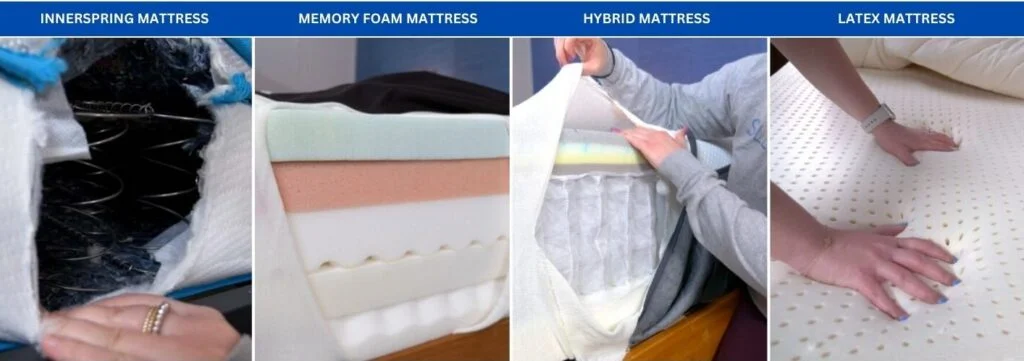
- Memory Foam: Memory foam mattresses can be great for those with arthritis because they provide contouring and pressure relief.
- Hybrid: Hybrid mattresses are popular because they combine gentle foam top layers with sturdy steel coils. If you struggle with arthritis, I recommend a hybrid with soft, thick upper layers and a base with zoned support coils.
- Latex: Latex mattresses are typically responsive, provide excellent natural cooling, and are eco-friendly. Although they are technically a foam, they don’t offer as much contouring as memory or poly foam, which may not be ideal for those with hip or shoulder arthritis. If latex has piqued your interest, take a look at our best latex mattress article.
- Innerspring: For an innerspring mattress to work for someone with arthritis, it will need a thick, plush pillow top. Without this soft entry to the bed, it likely won’t offer enough pressure relief. However, if you like the traditionality of these beds, you can read our picks for the best innerspring mattress.
Support
Though definitions of support vary from expert to expert, we typically like to think of it as a measure of how well (or not well) a mattress can set the spine in a nice, even line from the neck to the lower back. If a bed is genuinely supportive, you should experience this neutral alignment regardless of your sleeping position.
To determine the support level of your mattress, pay extra close attention to the foundational core of the bed. In our experience, pocketed coils or steel springs will be the most supportive materials. They lend their structures a ton of bounce, firmness, and support, working to position the sleeper squarely on top of the bed. In all-foam models, keep an eye out for high-density poly foam, which gives those structures some nice stability and shape.
Additionally, when it comes to mattresses for arthritis, we’re big fans of mattresses that employ zoned support in their constructions. As we explored earlier, zoned support refers to any layer of foam subdivided into different firmnesses. Typically, these zoned sections feature firmer foam at the hips, preventing them from sinking out of alignment with the shoulders. These mattresses can benefit sleepers with arthritis who want support in some areas and contouring in others.
Firmness
Mattress firmness affects how your mattress feels but can indicate the level of support and pressure relief a mattress will offer you. While firm mattresses can have excellent pressure relief, softer mattresses are generally more contouring and can provide better pressure relief for sleepers with arthritis than firmer mattresses. We recommend that sleepers with arthritis opt for a softer mattress that can contour to their sensitive joints. Firmer mattresses generally offer more support and may be suitable for sleepers with back pain or those needing more spinal alignment help.
Firmness also matters for your unique sleeping position. We generally recommend stomach sleepers opt for a firmer mattress, back sleepers for a medium-firm mattress, and side sleepers looking for something softer.

To test the firmness levels of our mattress, we use a firmness scale, which ranks mattresses from 1 to 10, with 1 being the softest and 10 being the firmest. A 6.5 out of 10 is our standard for a medium-firm mattress. For sleepers with arthritis, we typically recommend a softer bed that can offer pressure relief and contouring to sensitive joints. Something below a 6.5 on our mattress firmness scale should offer a hugging and contouring feeling that sleepers with arthritis should enjoy. This firmness level can offer enough support while still being comfortable and hugging.
Body Type and Sleep Position
How firm a bed feels or how much pressure relief you get is subjective, as it largely depends on how much you weigh. For lightweight sleepers — those who weigh under 130 pounds — a firm mattress may feel even firmer; for larger-bodied sleepers — those weighing over 230 pounds — a firm mattress may not feel as firm.

We recommend considering your body shape and body weight when looking into the right mattress for arthritis. For a quick reference, here is how we categorize sleepers by weight:
- Lightweight Sleepers: < 130 pounds
- Average-weight Sleepers: 130–230 pounds
- Larger Sleepers: > 230 pounds
Sleeping on your back, side, or stomach can also affect the type of mattress that works best for you. Reference this chart to see what firmness level you should seek for your weight and preferred sleep position.
| Weight | Side Sleepers | Stomach Sleepers | Back Sleepers |
| < 130 pounds | Soft to Medium: 3 to 5 | Medium soft to Medium firm: 4 to 6 | Soft to Medium: 3 to 5 |
| 130 – 230 pounds | Medium soft: 4 to 5 | Medium firm: 5 to 7 | Medium to Firm: 5 to 8 |
| > 230 pounds | Medium to Firm: 6 to 8 | Firm to Extra Firm: 7 to 9 | Firm to Extra Firm: 7 to 9 |
Cooling
If you have trouble falling asleep due to arthritic pain, you will want to be sure nothing else stands in your way of a good night’s sleep. One thing that can disrupt your sleep is a warm mattress, so you may want to look out for something cooling.
If you are a hot sleeper, I recommend looking for a mattress with cooling materials like breathable coils, gel-infused foams, cooling covers, or breathable materials like cotton.
We tested the mattresses in this list for their cooling properties using a temperature gun, the results of which you can see above. We measured the temperature of the mattresses before and after our tester laid on them for 10 to 15 minutes. A temperature difference below 10 degrees is considered good cooling, and anything below 6 degrees is excellent cooling. If you are a hot sleeper and want to be sure your bed is cooling, we recommend looking at our picks for the best cooling mattresses.
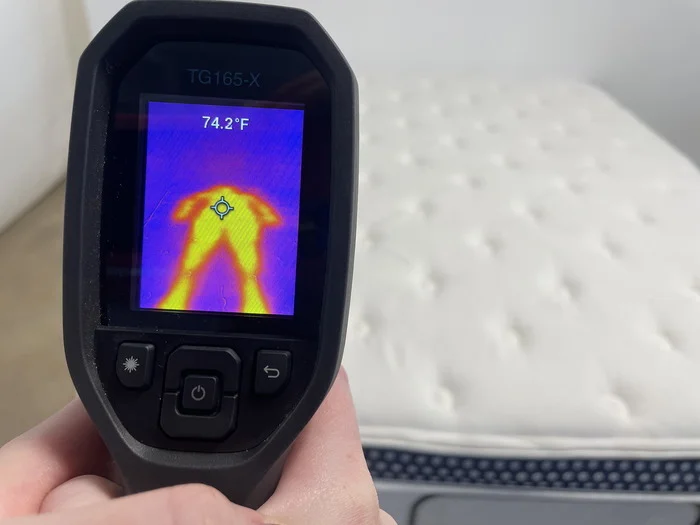
Motion Isolation
If you typically sleep alone, you won’t be concerned with how well a bed isolates motion. However, if you sleep with a restless partner or even pet, this can be an important feature. If you are already dealing with arthritis pain, it may be hard to obtain quality sleep, and you certainly don’t want a mattress where you can feel your bedmate’s movement. You will want the motion they create to remain isolated to their side of the bed. I used a seismograph app to measure how much movement rippled from one side of the bed, and I conducted a water glass test to evaluate how much movement caused a glass of water to spill.
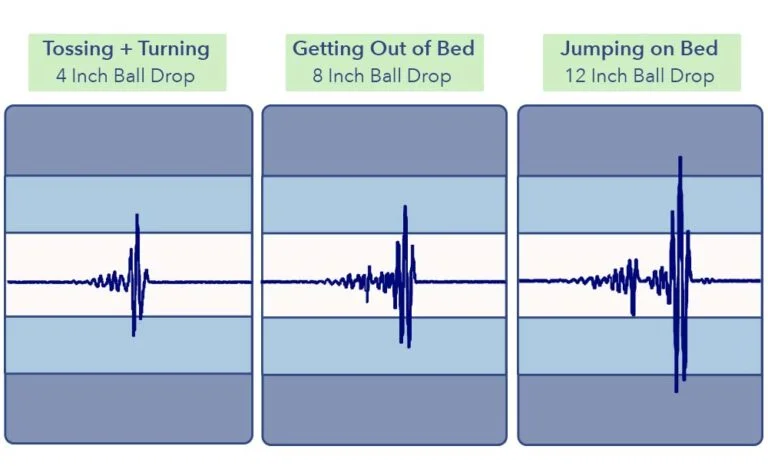
Responsiveness
How responsive a bed is is just a fancy way of describing how much bounce you feel on a given bed. Testing this feature may be the most fun because we actually jump and roll around on the bed to see how easy it is to move and reposition. We also use a medicine ball and lacrosse ball to see how springy the top part of the bed is. A responsive bed can benefit combination sleepers and sexually active people with arthritis because they won’t have to put as much effort into repositioning. However, these mattresses typically don’t offer as much pressure relief as less bouncy materials.
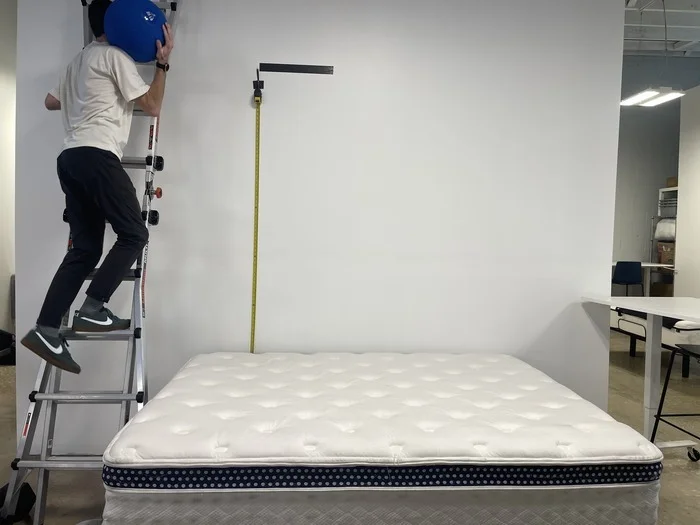
Edge Support
Beds with good edge support bolster sleepers across the entire surface of the bed. A strong perimeter can also make it easier for those with arthritis to get in and out of bed while lowering the risk of falling out of the bed if you’re sleeping on your side along the edge, likely exacerbating your arthritic pain.
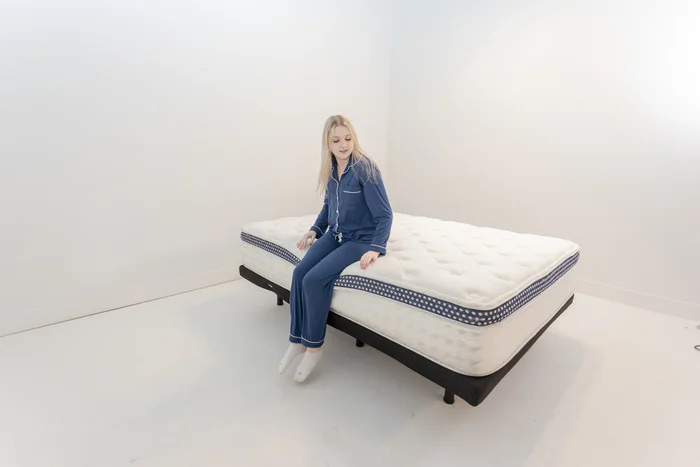
Tips for Sleeping with Arthritis
While a good mattress is not a cure to arthritic pain or discomfort, it can help you sleep better and more comfortably, so we recommend starting there. However, you can take some steps to sleep better with arthritis. We suggest consulting a doctor before you try any of these treatments or take any medication.
- Anti-inflammatory medication: Anti-inflammatory medications can help to reduce pain and soften the pain felt around the joints, which helps you get more comfortable while sleeping and falling asleep.
- Sleeping on your back or side: Sleeping on your back or side can help reduce pain and pressure and help keep the body aligned healthily. These sleeping positions are also better for softer mattresses, which we recommend for sleepers with arthritis.
- Use the right pillow: Using a contouring pillow under your head or a body pillow may provide better pressure relief when sleeping. It can also help you get more comfortable and fall asleep easier.
- Avoid alcohol: Alcohol can interfere with sleep as it is, so it may make it harder to fall asleep when drinking. Also, if you have the form of arthritis known as gout 3, alcohol can be particularly problematic as attacks can be brought on by purine-rich foods such as beer.
- Exercise: Consistent exercise can help maintain balance and comfort across the body and may improve motion in sensitive joints.
- Mattress topper: Adding a contouring and pressure-relieving foam mattress topper to your sleep surface can help you sleep more comfortably with arthritis. You can check out some of our top picks for the best mattress toppers to learn more.
FAQs
What is the best mattress for arthritis?
The best mattress varies from person to person since everyone has different body types and preferred sleeping positions. However, the Saatva Classic sits atop our list because of its balance of comfort and support that can cushion the joints and provide spinal alignment.
Is a soft or firm mattress better for arthritis?
Generally, softer mattresses are gentler on the joints, cushioning them to prevent pressure buildup. However, depending on your body type and sleeping position, you might need a medium-firm mattress to provide more support.
Are memory foam mattresses good for joint pain?
Yes, memory foam mattresses can be great for joint pain. The slow-moving, sinking feel is gentle on sensitive areas and can help alleviate pain. However, we recommend selecting a memory foam mattress with a sturdy, high-density foam base to ensure you’re not sinking into the layers too far.
Can a mattress help arthritis?
A new mattress cannot cure arthritis, but a bed that helps with contouring and offers deep pressure relief can help sleepers with arthritis get more comfortable and alleviate some of the pain they may have when sleeping.






























